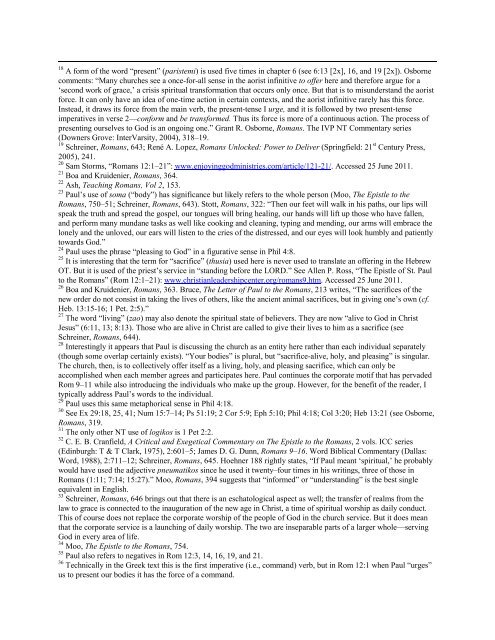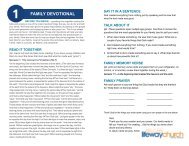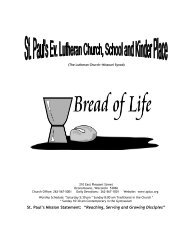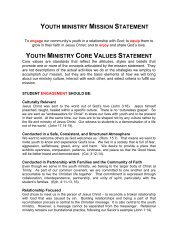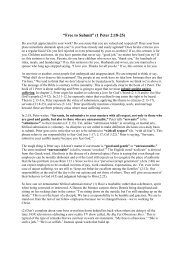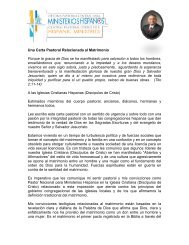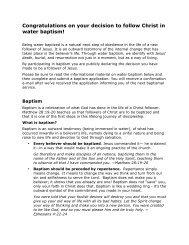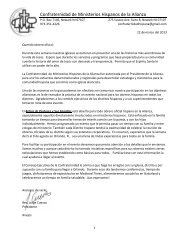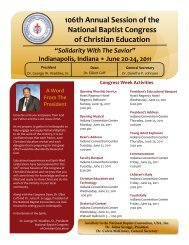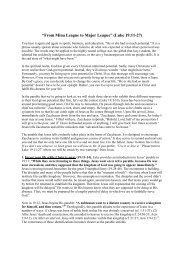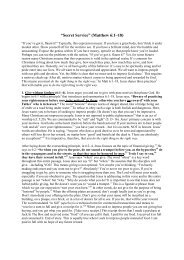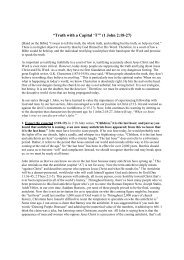“Transformed: More Than Meets the Eye” (Romans 12 - Razorplanet
“Transformed: More Than Meets the Eye” (Romans 12 - Razorplanet
“Transformed: More Than Meets the Eye” (Romans 12 - Razorplanet
You also want an ePaper? Increase the reach of your titles
YUMPU automatically turns print PDFs into web optimized ePapers that Google loves.
18 A form of <strong>the</strong> word “present” (paristemi) is used five times in chapter 6 (see 6:13 [2x], 16, and 19 [2x]). Osborne<br />
comments: “Many churches see a once-for-all sense in <strong>the</strong> aorist infinitive to offer here and <strong>the</strong>refore argue for a<br />
‘second work of grace,’ a crisis spiritual transformation that occurs only once. But that is to misunderstand <strong>the</strong> aorist<br />
force. It can only have an idea of one-time action in certain contexts, and <strong>the</strong> aorist infinitive rarely has this force.<br />
Instead, it draws its force from <strong>the</strong> main verb, <strong>the</strong> present-tense I urge, and it is followed by two present-tense<br />
imperatives in verse 2—conform and be transformed. Thus its force is more of a continuous action. The process of<br />
presenting ourselves to God is an ongoing one.” Grant R. Osborne, <strong>Romans</strong>. The IVP NT Commentary series<br />
(Downers Grove: InterVarsity, 2004), 318–19.<br />
19 Schreiner, <strong>Romans</strong>, 643; René A. Lopez, <strong>Romans</strong> Unlocked: Power to Deliver (Springfield: 21 st Century Press,<br />
2005), 241.<br />
20 Sam Storms, “<strong>Romans</strong> <strong>12</strong>:1–21”: www.enjoyinggodministries.com/article/<strong>12</strong>1-21/. Accessed 25 June 2011.<br />
21 Boa and Kruidenier, <strong>Romans</strong>, 364.<br />
22 Ash, Teaching <strong>Romans</strong>, Vol 2, 153.<br />
23 Paul’s use of soma (“body”) has significance but likely refers to <strong>the</strong> whole person (Moo, The Epistle to <strong>the</strong><br />
<strong>Romans</strong>, 750–51; Schreiner, <strong>Romans</strong>, 643). Stott, <strong>Romans</strong>, 322: “Then our feet will walk in his paths, our lips will<br />
speak <strong>the</strong> truth and spread <strong>the</strong> gospel, our tongues will bring healing, our hands will lift up those who have fallen,<br />
and perform many mundane tasks as well like cooking and cleaning, typing and mending, our arms will embrace <strong>the</strong><br />
lonely and <strong>the</strong> unloved, our ears will listen to <strong>the</strong> cries of <strong>the</strong> distressed, and our eyes will look humbly and patiently<br />
towards God.”<br />
24 Paul uses <strong>the</strong> phrase “pleasing to God” in a figurative sense in Phil 4:8.<br />
25 It is interesting that <strong>the</strong> term for “sacrifice” (thusia) used here is never used to translate an offering in <strong>the</strong> Hebrew<br />
OT. But it is used of <strong>the</strong> priest’s service in “standing before <strong>the</strong> LORD.” See Allen P. Ross, “The Epistle of St. Paul<br />
to <strong>the</strong> <strong>Romans</strong>” (Rom <strong>12</strong>:1–21): www.christianleadershipcenter.org/romans9.htm. Accessed 25 June 2011.<br />
26 Boa and Kruidenier, <strong>Romans</strong>, 363. Bruce, The Letter of Paul to <strong>the</strong> <strong>Romans</strong>, 213 writes, “The sacrifices of <strong>the</strong><br />
new order do not consist in taking <strong>the</strong> lives of o<strong>the</strong>rs, like <strong>the</strong> ancient animal sacrifices, but in giving one’s own (cf.<br />
Heb. 13:15-16; 1 Pet. 2:5).”<br />
27 The word “living” (zao) may also denote <strong>the</strong> spiritual state of believers. They are now “alive to God in Christ<br />
Jesus” (6:11, 13; 8:13). Those who are alive in Christ are called to give <strong>the</strong>ir lives to him as a sacrifice (see<br />
Schreiner, <strong>Romans</strong>, 644).<br />
28 Interestingly it appears that Paul is discussing <strong>the</strong> church as an entity here ra<strong>the</strong>r than each individual separately<br />
(though some overlap certainly exists). “Your bodies” is plural, but “sacrifice-alive, holy, and pleasing” is singular.<br />
The church, <strong>the</strong>n, is to collectively offer itself as a living, holy, and pleasing sacrifice, which can only be<br />
accomplished when each member agrees and participates here. Paul continues <strong>the</strong> corporate motif that has pervaded<br />
Rom 9–11 while also introducing <strong>the</strong> individuals who make up <strong>the</strong> group. However, for <strong>the</strong> benefit of <strong>the</strong> reader, I<br />
typically address Paul’s words to <strong>the</strong> individual.<br />
29 Paul uses this same metaphorical sense in Phil 4:18.<br />
30 See Ex 29:18, 25, 41; Num 15:7–14; Ps 51:19; 2 Cor 5:9; Eph 5:10; Phil 4:18; Col 3:20; Heb 13:21 (see Osborne,<br />
<strong>Romans</strong>, 319.<br />
31 The only o<strong>the</strong>r NT use of logikos is 1 Pet 2:2.<br />
32 C. E. B. Cranfield, A Critical and Exegetical Commentary on The Epistle to <strong>the</strong> <strong>Romans</strong>, 2 vols. ICC series<br />
(Edinburgh: T & T Clark, 1975), 2:601–5; James D. G. Dunn, <strong>Romans</strong> 9–16. Word Biblical Commentary (Dallas:<br />
Word, 1988), 2:711–<strong>12</strong>; Schreiner, <strong>Romans</strong>, 645. Hoehner 188 rightly states, “If Paul meant ‘spiritual,’ he probably<br />
would have used <strong>the</strong> adjective pneumatikos since he used it twenty–four times in his writings, three of those in<br />
<strong>Romans</strong> (1:11; 7:14; 15:27).” Moo, <strong>Romans</strong>, 394 suggests that “informed” or “understanding” is <strong>the</strong> best single<br />
equivalent in English.<br />
33 Schreiner, <strong>Romans</strong>, 646 brings out that <strong>the</strong>re is an eschatological aspect as well; <strong>the</strong> transfer of realms from <strong>the</strong><br />
law to grace is connected to <strong>the</strong> inauguration of <strong>the</strong> new age in Christ, a time of spiritual worship as daily conduct.<br />
This of course does not replace <strong>the</strong> corporate worship of <strong>the</strong> people of God in <strong>the</strong> church service. But it does mean<br />
that <strong>the</strong> corporate service is a launching of daily worship. The two are inseparable parts of a larger whole—serving<br />
God in every area of life.<br />
34 Moo, The Epistle to <strong>the</strong> <strong>Romans</strong>, 754.<br />
35 Paul also refers to negatives in Rom <strong>12</strong>:3, 14, 16, 19, and 21.<br />
36 Technically in <strong>the</strong> Greek text this is <strong>the</strong> first imperative (i.e., command) verb, but in Rom <strong>12</strong>:1 when Paul “urges”<br />
us to present our bodies it has <strong>the</strong> force of a command.


